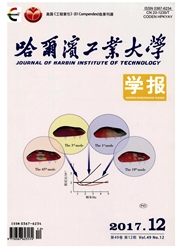

 中文摘要:
中文摘要:
针对传统双链量子遗传算法收敛速度慢、搜索精度低、鲁棒性差等不足,提出一种F型双链量子遗传算法(F_DCQ-GA).对编码空间进行单值映射处理,在保证量子种群适应度值与相应幅角排序单调性的前提下,缩小算法的搜索空间,增加搜索密度;在量子更新时引入自适应步长因子,使步长随目标函数在搜索点处梯度的变化而变化,有效解决了传统寻优算法普遍存在的全局最优解搜索困难的问题;在染色体变异更新时提出了π/6门,克服了原来非门变异无法更新量子比特概率幅的缺点.将F_DCQGA优化算法应用于小波阈值去噪的阈值选择机制中,通过仿真证明F_DCQGA优化算法提高了小波阈值函数的收敛速度和搜索精度,在图像边缘特征提取中可以获得更小的均方误差(S_(ME))和更大的峰值信噪比(R_(PSN)),同时又保留了大部分高频信息.
 英文摘要:
英文摘要:
To solve the problems of slow convergence speed, low search precision and poor robustness in traditional double chains quantum genetic algorithm, a new double chains quantum genetic algorithm (F_ DCQGA ) is proposed. The coding space is mapped to reduce the algorithm searching space and increases searching density, under the premise of guaranteeing quantum population adaptation and argument population monotonicity. The adaptive step-length factor is introduced to the quantum updating, which changes the step-length with gradient of objective function in searching points. This could solve the global optimal solution search difficulties caused by oscillatory occurrence in traditional optimization algorithm. Quantum π/6 gate is presented in chromosome mutation upadating, to overcome the shortcoming that NOT gate can not update quantum bit probability amplitude. The F_ DCQGA is applied to the threshold selection of wavelet threshold denoising. Simulation results show that F_DCQGA improves the convergence speed of the wavelet threshold function and searching precision. And in image edge feature extraction, the smaller mean square error (SME) and larger peak signal to noise ratio (RPSN ) are gained. Simultaneously, the high frequency information is also retained.
 同期刊论文项目
同期刊论文项目
 同项目期刊论文
同项目期刊论文
 期刊信息
期刊信息
